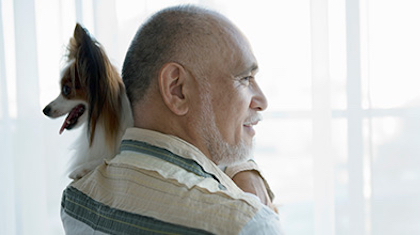5 tips for staying connected in retirement
While it might be great to have left the workforce and have more time to do the things you want, retiring can also present some challenges. This may be the case if you have friends or family who’ve moved away, passed away or who have interests of their own.

It’s important to try to maintain social connections to avoid feeling lonely or isolated.
Having a sense of purpose and social connection are two of the most important factors for health and wellbeing in retirement1.
Here are some ways you can do this.
1. Keep busy
Venture out and find opportunities to participate in new hobbies or social activities.
You can keep yourself mentally active and engaged by furthering your education. It’s never too late to learn. Check out what your local universities or TAFE institutes offer, or see what’s available online.
And if you just want to go out there and have fun, check websites like About over 50: For fun, social or business or clubs, classes, and activities in your local area.
2. Find a new purpose through volunteering
Giving back to society can be a richly rewarding experience.
Think about what you’re passionate about and what causes you’d like to support. You could also volunteer at a charity or at your local library.
Organisations like Volunteering Australia or the Rotary Club always welcome an extra pair of hands. You could also build some great relationships with the people you’re helping.
3. Broaden your travel horizons
Not only is travelling a great way to pass time and see new places, but research has found that it can also2:
-
improve your health
-
boost your mood
-
reduce your stress levels, and
-
help you develop new friendships.
Why not explore more of Australia through caravanning? Or check out the 50+ Travel Club for opportunities to travel with others in the same age group.
If you have a Seniors Card take advantage of your travel concessions. There are many travel agencies and websites dedicated to providing the best deals and experiences for older Australians, such as Seniors Holiday Travel.
4. Go back to work, but do something different
There are many organisations that value mature workers. After all, you have a lifetime of skills up your sleeve. Check out some senior-specific recruitment sites like Older workers and Be Next. Or consider starting your own business.
5. Get a house mate or furry friend
Research tells us living alone can often bring on social isolation, which can contribute to poor health and depression in older people3.
So if you are living alone, getting a house mate will ensure you have more company, and you’ll also benefit in other ways. They can share household expenses and chores, and be there in the case of emergencies.
Companion animals have also been associated with improved physical, social and psychological health4. It may seem like a lot of work, but getting an older animal is an option if you don’t have the energy for a puppy.
For more information about making the most of your retirement please contact us on 0437 782 836.
Source: AMP 15 May 2017
1 Australia Institute of Family Studies, The golden years? Social isolation among retired men and women in Australia, Roger Patulny, 2009
2 http://www.globalcoalitiononaging.com/index.php?id=travel-and-healthy-aging-the-journey-and-the-destination
3 https://aifs.gov.au/publications/family-matters/issue-83/golden-years
4 http://www.racgp.org.au/afp/2012/june/the-pet-effect/
This article provides general information and hasn’t taken your circumstances into account. It’s important to consider your particular circumstances before deciding what’s right for you. Although the information is from sources considered reliable, we do not guarantee that it is accurate or complete. You should not rely upon it and should seek qualified advice before making any investment decision. Except where liability under any statute cannot be excluded, we do not accept any liability (whether under contract, tort or otherwise) for any resulting loss or damage of the reader or any other person.



